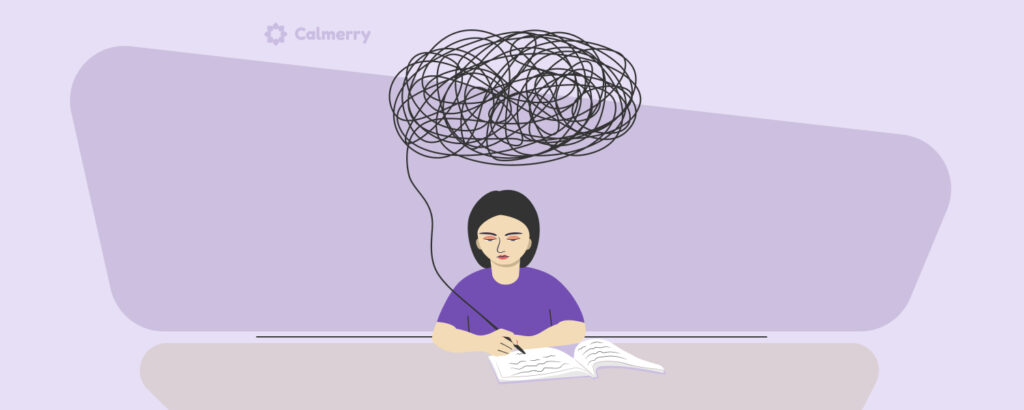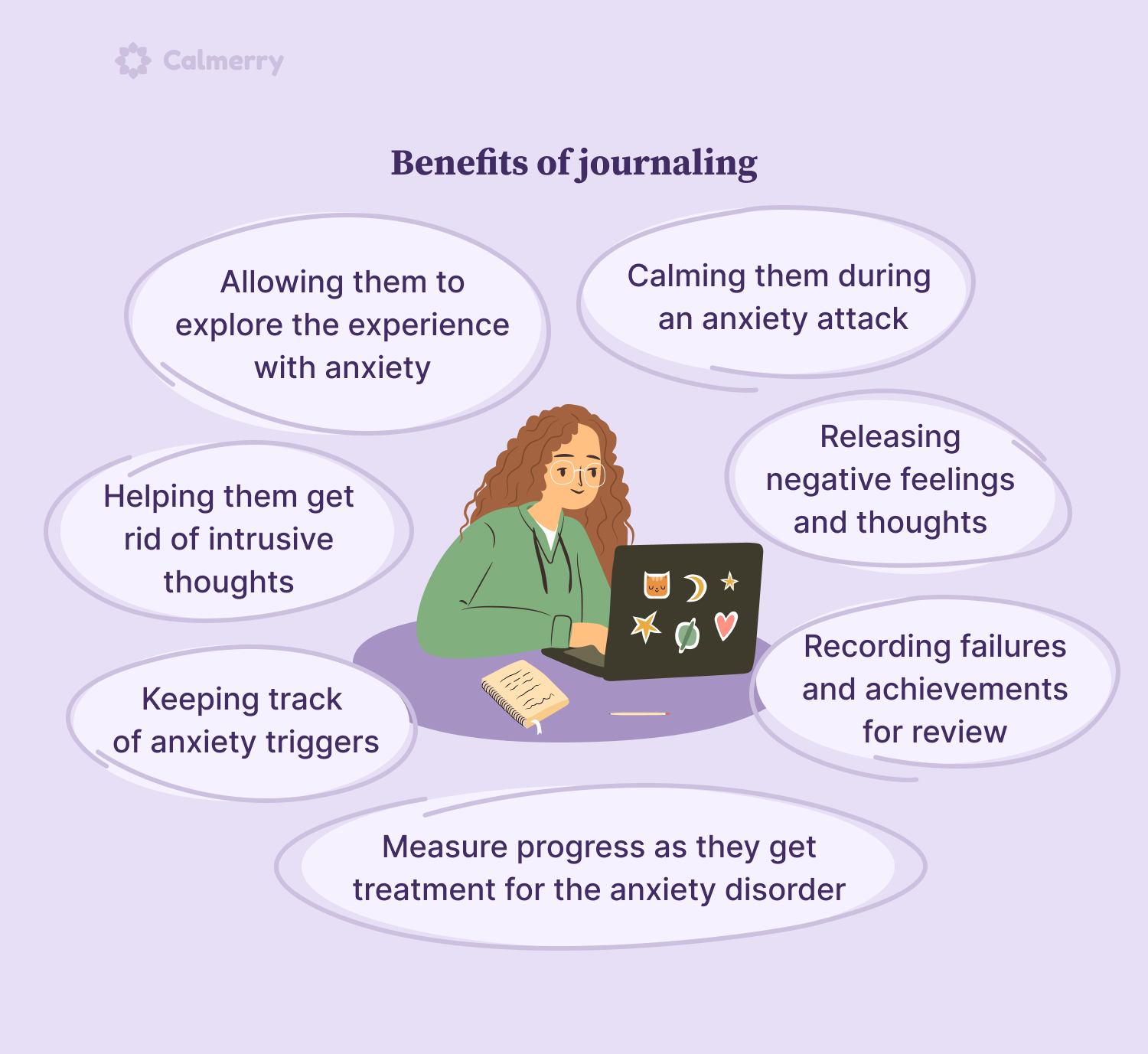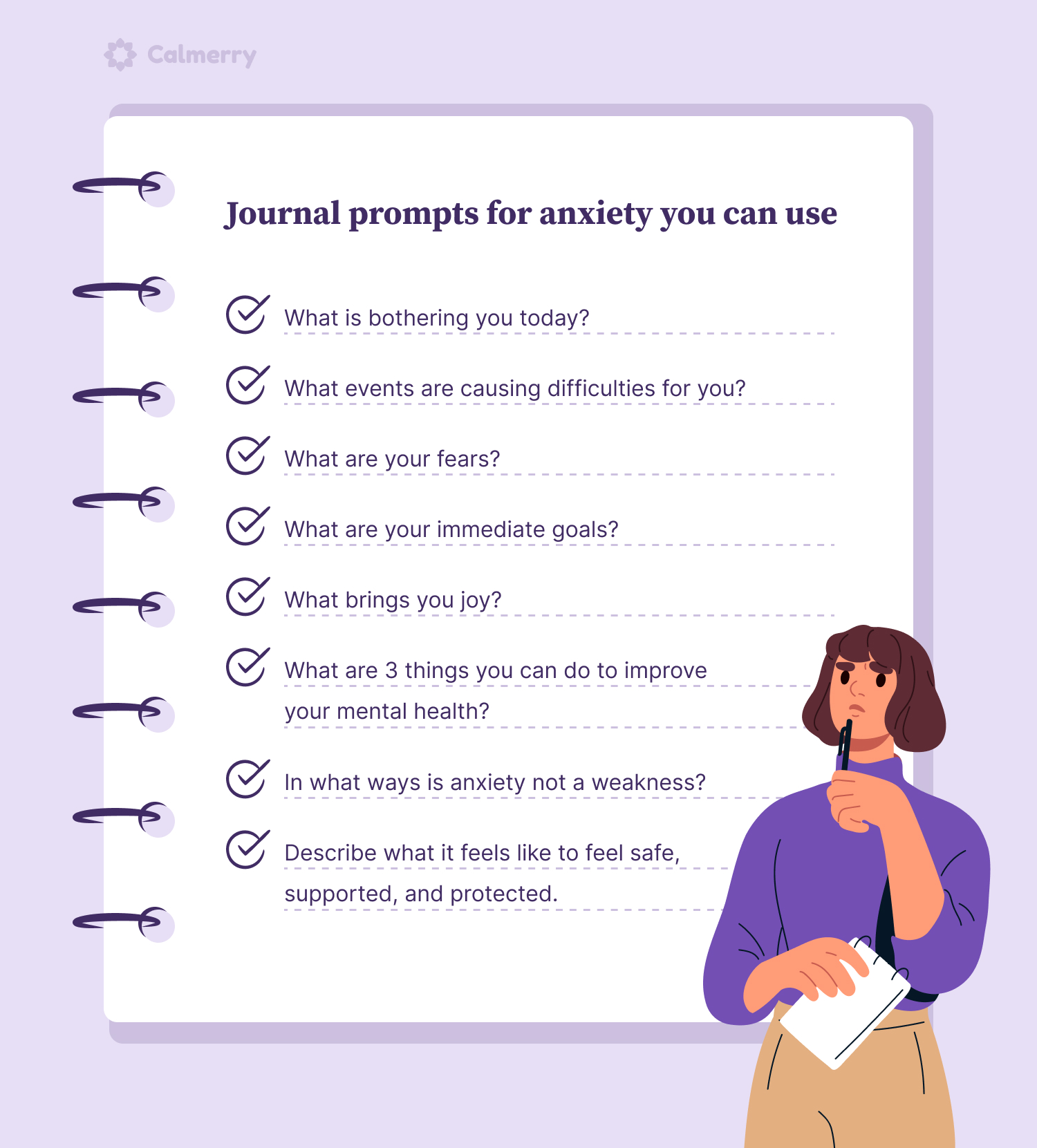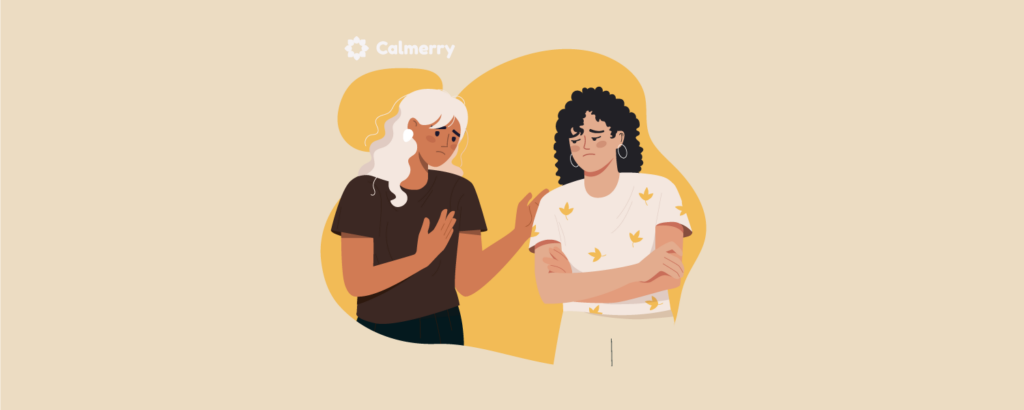How to Use Journaling for Anxiety? + 6 Journal Prompts to Try Now

Table of Contents
Coping with anxiety can be difficult, and if left unchecked, it can lead to chronic stress and rumination that have a negative impact on your well-being and can contribute to many health problems, including heart diseases, high blood pressure, diabetes, and obesity. Chronic stress also impacts and alters your mind, so you feel overwhelmed and exhausted.
Your body and mind need help, and journaling can be an effective coping technique that will help you work through your anxious feelings, organize your thoughts, and process them in a healthy way. Here is everything you need to know about journaling for anxiety.
What is journaling?
Journaling practice can look different from person to person. But, in its simplest form, journaling is writing about your thoughts and feelings, so it’s like a big thought record. Keeping such a record may help you identify patterns in your anxiety as well as potential stress triggers.
Journaling offers quick relief from the buildup of negative emotions, so your brain will thank you. You’ll also be able to look back and see how much you have grown emotionally.
Journaling is a simple technique, and there are no rules about how you should journal. There is also no exception to who can use this practice for stress management. The main thing is to make this practice a regular habit.
How to keep an anxiety journal?
There are many journaling techniques to try out, so it’s all about finding a type of journaling for anxiety that works for you. And remember that there are no wrong ways to journal. If you don’t know where to begin, you can use reflective journal prompts that can help you get started.
Visual journaling
Not everyone is good with words. Some people may get anxious at the sight of a blank paper, knowing they have to fill it with writing. Others may prefer drawing to writing. Visual journaling is more focused on visual design than words. You can use mixed media for visual journaling. Pencils, paint, paper, and photographs are useful for expressing emotions.
Musical journaling
Would you rather tell your story through music? You can express joy, sadness, anger, and frustration through musical journaling. You don’t have to be a talented musician to use this technique. You don’t have to spend money on expensive equipment either.
Turn anything in your house into a drum, and express your emotions through it. Record the music so that you can reflect on it later. An autobiographical song, for example, is great for deep reflection.
Gratitude journal
When you have anxiety, it is easy to obsess over negative things. You may get so wrapped up in everything that might go wrong that you ignore the good things you have. Writing a gratitude journal refocuses your mind on all the positive things in your life that you can be thankful for. You may just write five things you are grateful for each day, but it’s important to be specific and think about why you’re feeling grateful.
Intuitive journaling
Extreme stress and anxiety can get you out of touch with your intuition. You might be unable to trust your gut. Because you are distressed, your decision-making might be impaired. Intuition journaling helps you navigate your thoughts and realize what you truly want. It requires you to write a question that is bothering you and listen to your inner voice for an answer.
Stream of conscious journaling
Sometimes your mind and heart are so full that you don’t know where to begin. In this journaling technique, you start writing and pour out your anxieties on paper. Don’t control what you write about, and don’t worry about grammar. It is okay if your sentences are poorly punctuated. Just let it all out, keep going until you feel better.
Unsent letter journaling
Some things are better left unsaid. However, they can cause a significant amount of stress. If you are feeling burdened by something, you cannot say aloud, write it down. Phrase it as a letter, even though you will not send it. You can address someone specific even though they may never get to read the letter. It is a cathartic journaling technique that helps relieve pent-up emotions.
What-is-going-well journaling
Take daily notes of everything that is going well. Identify things that worked in your favor and write them down – you can use bullet points or notes. This journaling technique encourages positivity, and that can result in feeling less burdened.
How effective is journaling for anxiety?
A lot of studies have proven the benefits of journaling. For people with anxiety, the practice positively impacts their moods and symptoms by:
- Allowing them to explore the experience with anxiety
- Helping them get rid of intrusive thoughts
- Calming them during an anxiety attack
- Releasing negative feelings and thoughts
- Keeping track of anxiety triggers
- Recording failures and achievements for review
- Measure progress as they get treatment for the anxiety disorder

Journaling for mental health works by letting out emotions rather than stuffing them down. People with anxiety may feel shame, guilt, fear, or embarrassment. Through writing, the pain gets translated into words. It is a cathartic outlet for these feelings.
Putting down thoughts into words also works because it forces you to organize, examine, and learn from experiences. You can establish cause-and-effect relationships and gain a new understanding of different events and situations. In a way, writing effectively processes trauma and gives one a sense of control.
How to start journaling to deal with anxiety?
There are no rules when it comes to journaling. It can be done anyhow, anywhere, and by anyone. Here are some steps to follow when you want to start journaling to cope with anxiety:
- Decide whether you want a paper or digital journal
- Set aside a time of day when you can be by yourself and journal
- Start by writing about your present emotions and thoughts
- Explore the story you have written
- Reframe your story, looking for ways to challenge each fear
- Consider reaching out to someone you trust to share the contents of your journal.
6 Journal prompts for anxiety you can use
As simple as it sounds, journaling can be challenging to begin. You might not know what to say or how to frame your thoughts. Here are some anxiety journal prompts that can help you get started.
What is bothering you today?
Your anxiety stems from the voice in your head. What is it saying to you today? Write whatever is on your mind and keep going until you feel you have said it all. Be careful not to go into rumination, circling the same thoughts.
What events are causing difficulties for you?
Detail current events in your life. Remember that anxiety is often the fear of what could happen in the future. If you are worried about a certain event getting out of hand, you will realize that nothing bad has happened yet. It might bring you some relief.

What are your fears?
What are you afraid of? Is a certain event triggering your anxiety? What do you think will happen next? List all your fears and review them pragmatically. Sometimes, you will realize your fear is unreasonable. Other times, you will identify the best course of action to alleviate your fears.
What are your immediate goals?
Creating a list of goals gives you a sense of purpose. Set small goals that are achievable within a day. Do this in the morning as you prepare for school or work. As you achieve each goal and tick it off your list, you will feel relieved and accomplished. Having clear goals is calming because it reduces uncertainty.
Write an unsent letter
If your anxiety stems from someone else’s words or actions, you might not always be able to confront them. Write a frank letter that you will not send. You can even write a letter to yourself. Be completely honest in your letter, as it is a no-judgment outlet for your emotions.
Rapid writing
Sometimes it helps to let it all out without holding back. Set a timer and write until the timer goes off. Do not worry about what you are writing and whether it is grammatically correct. If you need to doodle, do it, provided you express your emotions.
Using your journal to track your mood and identify anxiety triggers
During the day, take note of your emotions. Write down when you are feeling happy, sad, angry, or anxious. Provide some context to each emotion; is there a specific event that made you feel a certain way? Doing so will help you identify what triggers your anxiety. Journaling for anxiety is more effective when you know your triggers.
Reflecting on journal entries to better understand your feelings
Reflection is an important aspect of journaling. It allows you to review your feelings and thoughts pragmatically. Ask yourself whether your fears are reasonable. Think of what you can do in the worst-case scenario; if your fears come true. Understanding the root cause of your feelings helps you find solutions and overcome anxiety.
The Bottom Line
Journaling for anxiety is a simple tool for controlling emotions and improving your mood. You can practice it anytime and anywhere – just choose a way of journaling that works best for you. In high-stress situations, putting your thoughts and feelings into words is cathartic because it helps you reevaluate your fears and take a positive, solution-oriented approach. You can challenge your negative thoughts or find healthy ways to address them.
But some mental health issues require more help than self-reflection and writing can provide. If you are struggling with anxiety and feel that you can’t manage it on your own, consider talking with a mental health professional that can provide you with guidance and support. On Calmerry, you can get matched with a licensed therapist that can help you get a better understanding of your triggers and help you learn effective coping skills.
-
Learn morePersonalized online therapyChoose video, messaging, or both to fit your schedule and comfort. Get matched with your therapist within 1 hour.
-
Learn moreOne 60-minute live video sessionSee how online therapy works and get quick support with a single therapy session. No commitments.



